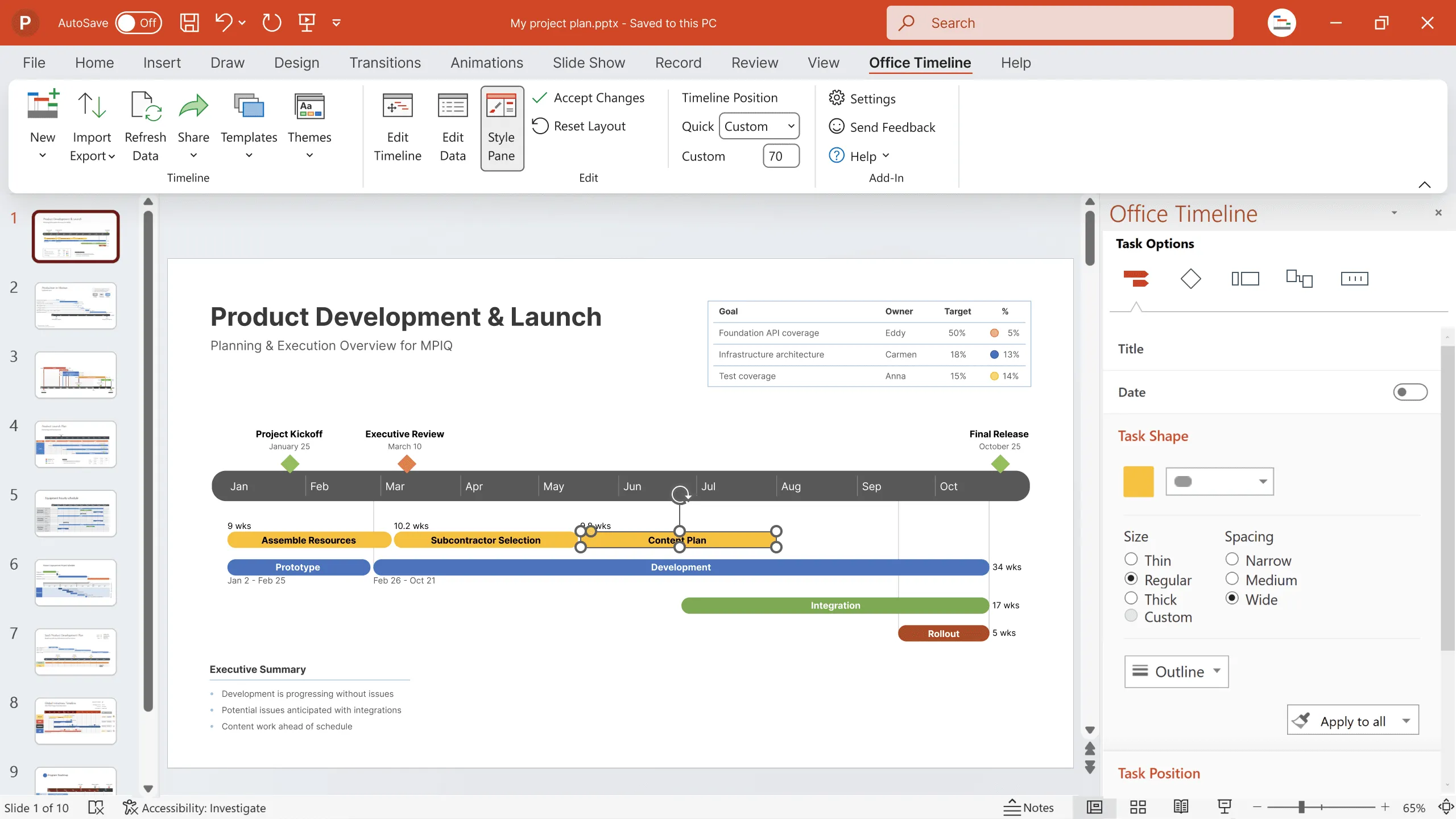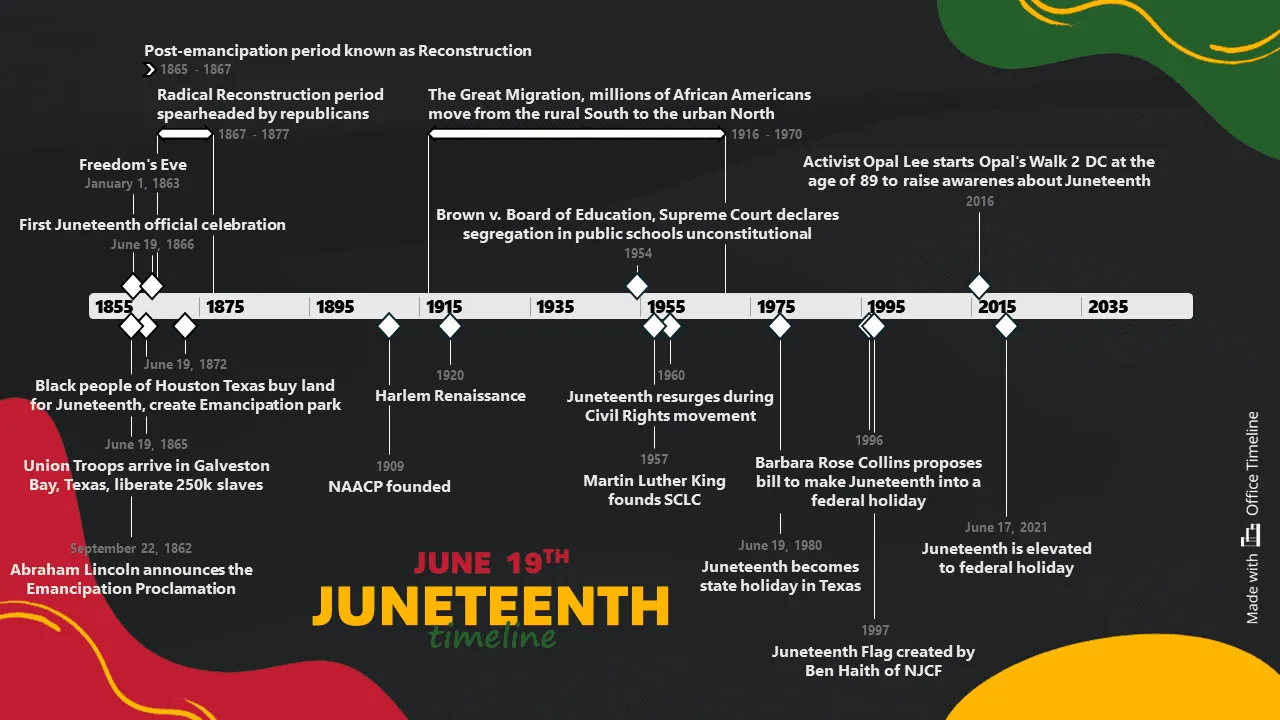History of Juneteenth timeline: A lesson in resilience
Juneteenth marks the emancipation of over four million enslaved African Americans. Celebrate this day with our Juneteenth timeline, which explores its rich history and journey to becoming a federal holiday. Reflect on the enduring quest for justice and equality in the US.
Legendary activist Opal Lee, often referred to as the grandmother of Juneteenth, famously said: “If people can be taught to hate, they can be taught to love. But we need to know, you can’t erase history. So, let’s learn from it and be damned sure it doesn’t happen again.”
Her words perfectly sum up the importance of recognizing and celebrating the diversity of cultures that have brought such major contributions to the journey of the United States. And, to paraphrase NY Times columnist Jamelle Bouie, the celebration of Juneteenth marks a single moment on the road to emancipation, but it’s an excellent occasion to reflect on the massive contribution of Black Americans to the cause of human freedom.
As such, let’s all take a trip through Juneteenth’s history and discover the origins, context, significance, and major events that have led to its recognition as a federal holiday. From all of us at Office Timeline, we wish you a happy Juneteenth day!
Historical origin of the Juneteenth
Juneteenth, for those who haven’t encountered it yet, is a portmanteau word combining “June” and “Nineteenth”. But why June and why the 19th? After all, Abraham Lincoln read the emancipation proclamation declaring that “all persons held as slaves […] are and, henceforward shall be free” on the 1st of January, 1863. Indeed, in many parts of the US, soldiers of the Union immediately marched from plantation to plantation spreading the news all throughout the Confederate States.
As it turns out, it would take longer for the westernmost states of the Confederacy to fall in line. Slavery was abolished in ALL states only after Congress passed the 13th Amendment, ratified on December 6, 1865. In Texas, freedom came much later, on June 19, 1865, when General Gordon debarked in Galveston Bay with around 2,000 troops and announced that over 250,000 previously enslaved black people were freed by executive decree.
One year later, on June 19, 1866, the very first families gathered in celebration in Texas, and the tradition slowly but surely spread to other states, including Arkansas, Louisiana, Alabama, Florida and California. Early Juneteenth celebrations involved barbeques, religious service, games and storytelling. Another important custom involved dressing up because, in their former lives as slaves, black people were strictly banned from wearing anything except the rags provided by the plantation owners.
Juneteenth milestones
- January 1, 1863 - Freedom's Eve
On the night of December 31, 1862, known as "Freedom's Eve," African Americans gathered in churches and homes across the country, awaiting news that the Emancipation Proclamation had taken effect. When the clock struck midnight, they communally celebrated the moment when the federal government legally freed all slaves in the Confederate States.
- June 19, 1865 - Union Troops arrive in Galveston Bay, Texas, liberate 250k slaves
Freedom came to the black people of Texas two years later, when Union Maj. General Gordon Granger arrived in Galveston Bay with General Order No. 3. This decree stated that all enslaved African Americans in the state of Texas were emancipated by executive decree, officially abolishing slavery there as well. This day would henceforth be remembered as Juneteenth.
- June 19, 1866 - First Juneteenth official celebration
The first official Juneteenth took place on June 19, 1866. Freed African Americans in Texas commemorated their newfound freedom with festivities that included music, food, prayer services, and the reading of the Emancipation Proclamation. It set the stage for annual Juneteenth celebrations.
- 1865 to 1867 - Post-emancipation period known as Reconstruction
The immediate post-emancipation period, known as Reconstruction, saw significant efforts to rebuild the South and integrate freed slaves into society. During this time, the Freedmen’s Bureau was established to assist formerly enslaved people in their transition to freedom, providing food, housing, and education.
- 1867 to 1877 - Radical Reconstruction period spearheaded by republicans
Radical Reconstruction, led by the Radical Republicans, began in 1867. This period involved more stringent requirements for Southern states' readmission to the Union and greater protection for African Americans' rights. Key initiatives included the passing of the 14th and 15th Amendments, which granted citizenship and voting rights to black Americans.
- 1872 - Black people of Houston Texas buy land for Juneteenth, create Emancipation Park
In 1872, African American community leaders in Houston, Texas, purchased 10 acres of land for $800 to create Emancipation Park. This park was dedicated specifically for Juneteenth celebrations and remains a significant cultural site to this day.
- 1909 - NAACP founded
The National Association for the Advancement of Colored People (NAACP) was founded in 1909. This civil rights organization was established to fight for justice for African Americans and played a crucial role in advocating for civil rights legislation throughout the 20th century.
- 1916 to 1970 - The Great Migration, millions of African Americans move from the rural South to the urban North
The Great Migration saw millions of African Americans move from the rural South to the urban North and West between 1916 and 1970. This migration significantly reshaped the demographic and cultural landscape of America, leading to the rise of influential African American communities and cultural movements.
- 1920 - Harlem Renaissance
The Harlem Renaissance was a cultural, social, and artistic explosion that took place in Harlem, New York, during the 1920s. This movement celebrated African American cultural expressions and had a profound impact on American culture, with figures like Langston Hughes and Zora Neale Hurston emerging as prominent voices.
- 1954 - Brown v. Board of Education, Supreme Court declares segregation in public schools unconstitutional
In 1954, the U.S. Supreme Court declared segregation in public schools unconstitutional in the landmark case Brown v. Board of Education. This decision was a critical victory for the civil rights movement and paved the way for further desegregation efforts across the country.
- 1957 - Martin Luther King founds SCLC
In 1957, Martin Luther King Jr. and other civil rights leaders founded the Southern Christian Leadership Conference (SCLC). The SCLC played a key role in organizing nonviolent protests and civil rights campaigns, including the Montgomery Bus Boycott and the March on Washington.
- 1960 - Juneteenth resurges during Civil Rights movement
At the height of the Civil Rights Movement of the 1960s, Juneteenth saw a resurgence in popularity. Civil rights activists used the holiday to highlight the ongoing struggle for racial equality and justice, connecting the historical fight for emancipation with contemporary efforts for civil rights.
- 1980 - Juneteenth becomes state holiday in Texas
In a historical move, Texas became the first state to officially recognize Juneteenth as a state holiday. This formal recognition helped to raise awareness of the holiday and its significance in American history.
- 1996 - Barbara Rose Collins proposes bill to make Juneteenth into a federal holiday
U.S. Representative Barbara Rose Collins introduced a bill to Congress proposing that Juneteenth be recognized as a federal holiday. Although the bill did not pass at the time, it marked an important step in the movement toward federal recognition of the holiday.
- 1997 - Juneteenth Flag created by Ben Haith of NJCF
Ben Haith, founder of the National Juneteenth Celebration Foundation (NJCF), created the Juneteenth flag. The flag's design symbolizes the history and freedom of African Americans, featuring a star that represents new beginnings and the American dream.
- 2016 - Activist Opal Lee starts Opal's Walk 2 DC at the age of 89 to raise awareness about Juneteenth
At the age of 89, activist Opal Lee began Opal's Walk 2 DC to raise awareness about Juneteenth and advocate for its recognition as a federal holiday. Her 1,400-mile journey from Fort Worth, Texas, to Washington, D.C., garnered absolutely massive national attention and support for the cause.
- June 17, 2021 - Juneteenth is elevated to federal holiday
On June 17, 2021, President Joe Biden signed the Juneteenth National Independence Day Act into law, making Juneteenth a federal holiday. This milestone acknowledged the historical significance of June 19th and its importance in American history, ensuring that the day is celebrated and remembered nationwide.
Closing thoughts on Juneteenth
The recognition of Juneteenth as a federal holiday might not mean the end of structural racism in the United States, but it’s definitely a pivotal step in the right direction. In addition to its historical significance, Juneteenth is a cornerstone of African American heritage that integrates music, spirituality, food and traditions, which are just some of the many amazing contributions black people brought to society. It is, in equal measure, a powerful reminder of the struggle and resilience of their culture, and perhaps a message of hope that one day we may all be truly free and truly equal.
About the Juneteenth history timeline
The Juneteenth timeline was created with Office Timeline, our robust and intuitive add-in for PowerPoint that can help you create and update amazing visuals for your presentations. The Juneteenth timeline can be downloaded for free as an editable, fully customizable PowerPoint slide. To modify it, you can either use PowerPoint’s controls, or install the trial version of Office Timeline, which will automate and speed up the process.
Frequently asked questions about Juneteenth
Let’s try to address some of the most common questions people have about the Juneteenth holiday.
Juneteenth, celebrated on June 19th, commemorates the end of slavery in the United States. It marks the day in 1865 when Union General Gordon Granger announced in Galveston, Texas, that all enslaved people were free, approximately two years and a half after the Emancipation Proclamation. This day is celebrated to honor African American freedom and achievement, while encouraging continuous self-development and respect for all cultures.
On June 19, 1865, Union General Gordon Granger arrived in Galveston, Texas, and read General Order No. 3, which declared that all enslaved people in Texas were free. This announcement came more than two years after the Emancipation Proclamation, finally bringing freedom to the last large group of enslaved African Americans in the Confederate States.
Yes, Juneteenth became a federal holiday on June 17, 2021, when President Joe Biden signed the Juneteenth National Independence Day Act into law. This recognition underscores the importance of Juneteenth in American history and acknowledges the end of slavery in the United States.
Yes, there is a Juneteenth flag, created in 1997 by Ben Haith, founder of the National Juneteenth Celebration Foundation (NJCF). The flag features a bursting star to symbolize a new beginning for African Americans and the promise of freedom. The red, white, and blue colors reflect the American flag, emphasizing that the formerly enslaved people and their descendants are Americans.
Red foods are a traditional part of Juneteenth celebrations, symbolizing resilience and the bloodshed of enslaved ancestors. Common red foods include red velvet cake, strawberry soda, watermelon, and barbecued meats. These foods are integral to the festive and communal spirit of Juneteenth.
On Juneteenth, people often wear red, white, and blue, reflecting the colors of the Juneteenth flag and the American flag, to signify the connection to the broader American history and the freedom of African Americans. Some also wear green, black, and red, which are the colors of the Pan-African flag, symbolizing unity and liberation for people of African descent.
Opal Lee, often called the "Grandmother of Juneteenth," embarked on a walk from Fort Worth, Texas, to Washington, D.C., at the age of 89 to raise awareness for making Juneteenth a federal holiday. Although she symbolically walked 2.5 miles in each city she visited, the entire journey represented the 1,400 miles between Fort Worth and Washington, emphasizing her commitment to the cause.
Project management tips and tricks
Turn project data into professional timelines
Get the advanced features of Office Timeline free for 14 days.



